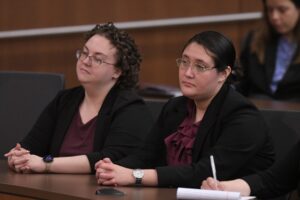Collecting Posts on Seventh Circuit Day
It was a great privilege for Marquette University Law School to host the U.S. Court of Appeals for the Seventh Circuit in Eckstein Hall earlier this semester (September 25, 2025). The following blog posts form a now-complete series seeking to capture some aspects of the day:
- Seventh Circuit Day, Part 1: The Cases and Arguments (Nov. 3, 2025) by Joseph D. Kearney
- Effective Appellate Advocacy: Advice from the Bench (Nov. 5, 2025) by Melissa Love Koenig
- Appellate Judges Give a Window into How They Do Their Work (Nov. 7, 2025) by Alan J. Borsuk
- Praise for an Exemplar of the Marquette Lawyer—and of a Judge (Nov. 11, 2025) by Alan J. Borsuk
- “Behind the Scenes” of Organizing a Visit by an Appellate Court (Nov. 13, 2025) by Anna Fodor
- Seventh Circuit Day at Eckstein Hall “Felt Like This ‘Event’” and Offered Valuable Lessons (Nov. 18, 2025) by Alan J. Borsuk
Sincere thanks to all—the Court and its staff, those at the Law School, and members of the Milwaukee legal community—who contributed to this inspiring educational experience.


